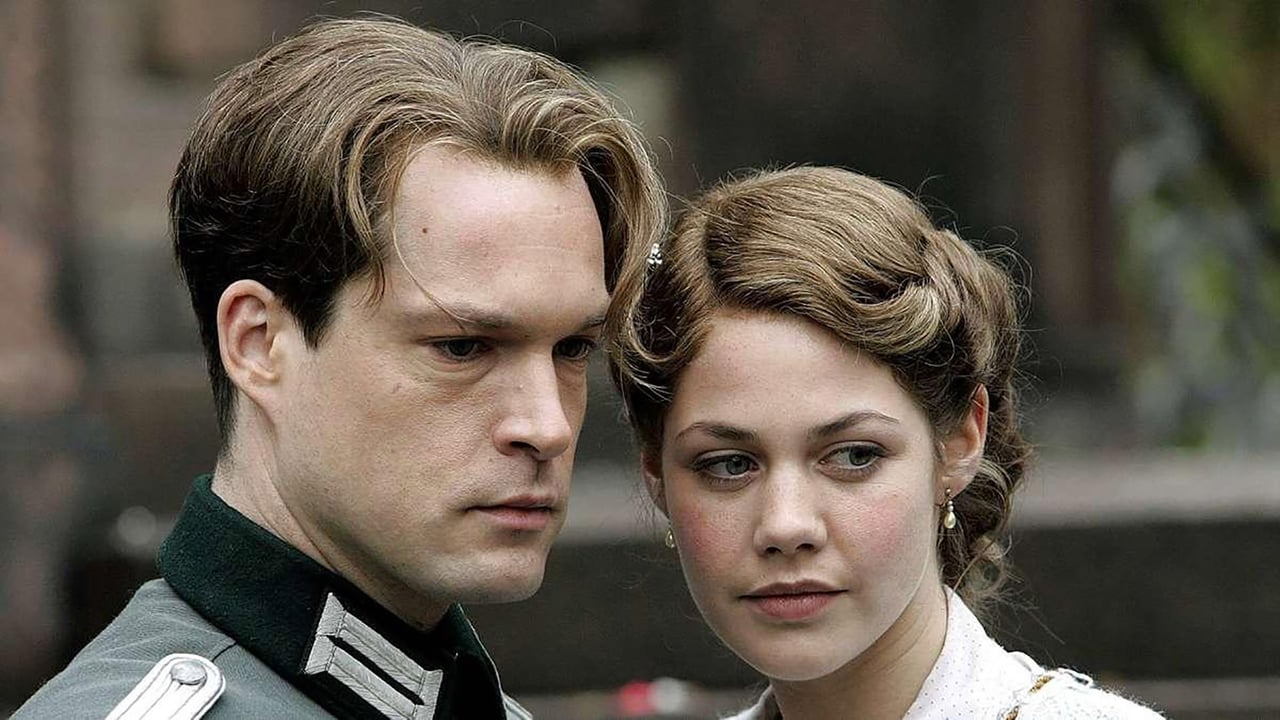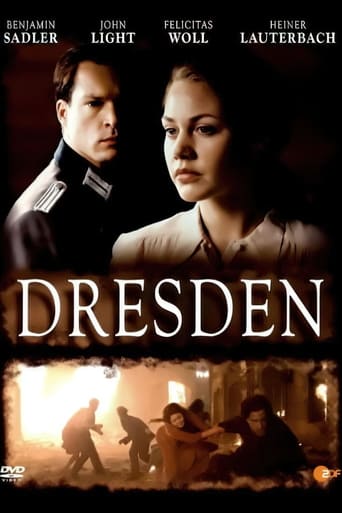

I think this is a new genre that they're all sort of working their way through it and haven't got all the kinks worked out yet but it's a genre that works for me.
... View MoreA bit overrated, but still an amazing film
... View MoreI am only giving this movie a 1 for the great cast, though I can't imagine what any of them were thinking. This movie was horrible
... View MoreThis is a small, humorous movie in some ways, but it has a huge heart. What a nice experience.
... View MoreThe central figure in this series is Felicitas Woll, a young nurse in a Dresden hospital who secretly helps a wounded British pilot, John Light, out of simple decency and then falls in love with him, despite her imminent marriage to a rather stiff doctor. It's all about her. And she carries it off nicely, cheerfully for the most part. If at first she looks a little chubby, after a few minutes of exposure she comes to resemble Meg Ryan with her gay smile. She has the most engaging nose too. Unremarkable except at its tip where its ordinary slope forms an impudent lump.It's a lengthy miniseries mostly in German with English subtitles. I wish more Americans were able to see this because it's intelligent, and many American's don't seem to get out much, and the younger among us don't hear much about Dresden. They're lucky if they know who fought who in World War II. Really. Forty percent of high school seniors think the US fought with the Nazis against the Russians in WW2. That's high school seniors, mind you. Back to the film. Like many mini-series it has multiple sub plots and an abundance of improbabilities. There's a nice couple, the Goldbergs, still surviving in Dresden because the wife is not a Jew. Yes, there were still Jews at large in Germany. One of the survivors of Dresden was the diarist Victor Klemperer, cousin to Otto, the conductor, and Werner Klemperer, or Colonel Klink as he's better known.There is Felicitas Woll's family -- an upright doctor/father who is trying desperately to bribe the way for his wife and daughters to Basel. (Kids, Basel is in Switzerland. Switzerland was neutral in World War II. It's usually neutral in war time because nobody wants a bunch of mountains, cows and cuckoo clocks.) They don't make it. Felicitas' love affair with the British pilot doesn't survive the immediate post-war period.I can't describe all of the details of all of the sub plots. The acting is unimpeachable and the photography and CGIs are outstanding for a TV production. When Dresden has been turned into an inferno, we don't simply see buildings on fire. We see wind machine whipping burning pieces of debris and sometimes people through the air with hurricane force winds. And there are some unusual touches. When bombs leave the Lancasters, they cause the release mechanisms to rattle. It's a small thing but no one has bothered with it before. And when there is the flash of a distant explosion, it takes a second or two for the WHOOM to reach the viewers. The dropping of the red and green flares by the Pathfinder Mosquitoes has the awesome, benign beauty of a fireworks display on the Fourth of July at the fairgrounds of some small town in the Midwest.There are some weaknesses too. John Light, as the fugitive pilot, may be a nice guy in real life but his part here limits him to suspicious scowls and he seems all jaw, like Powers Booth. If I were Felicitas Woll, I wouldn't fall in love with him at first sight, as she does. I'd fall in love with me and beg to come be my slave. Another gap in the historical record: the Americans completed the destruction of the ancient city with daylight raids. What the Brits didn't destroy, the American B-17s did. It's only alluded to once.The bombing of Dresden has always been controversial. There have been arguments for and against it. The consensus seems to be that it was a political act designed to assure Stalin that we were still interested in weakening Germany's battles on the eastern front. Of course Dresden had some importance as a military target. Even a German apple orchard had some importance. The problem is that the old city had little military significance because the war was already won and whatever local factories were still operating were in the suburbs, left untouched except by accident. The city itself was packed with refugees from the east, trying to escape the Russians. It was a terrible catastrophe. Civilians literally melted in air raid shelters. The film pins the blame on the Nazi regime that invited such mindless destruction, and on "Bomber" Harris, the RAF general who was determined the flatten every German city to destroy civilian morale. It didn't work. "Unsere mauern brechen, unsere herzen nicht," read the signs, until they were replaced by white flags. The Queen Mum unveiled a statue of Bomber Harris some years ago and there were some boos from the crowd.It all somehow resonates with something Jimmy Carter said in his acceptance speech at the Nobel Peace Prize award: "War may sometimes be a necessary evil. But no matter how necessary, it is always an evil, never a good. We will not learn to live together in peace by killing each other's children."
... View MoreA fictional love drama set on the background of Dresden at the end of World War II achieves to illuminate the complexity of human characters under the life-threatening terror of the Nazi-regime and the war.The excellent cast with Felicitas Woll, John Light and Benjamin Sadler as main figures involve the viewer into a very personal drama. As the screenplay avoids black-and-white-painting, multi-layered characters invite the viewer to a differentiating point of view.Realistic fire-scenes, carefully computer-animated flying-sequences and the participation of both British and German historians in pre-production contribute to a gripping movie about a sensitive point in German history.
... View MoreJust like Kleiner_Fuchs after watching this movie and other recent Teamworxx productions like "Sturmflut" I thought that, had Cameron not made "Titanic", these people would probably not rely so heavily on the ever repeated formula of a fictional doomed love with a hazardous historical background (though this is by no means a new concept). Contrary to my predecessor I think that in "Titanic" this worked out fine. But this may be mainly because a ship is a so much smaller microcosm than a city and the actual historical figures,though playing minor parts in the story pop up every few minutes.It might have worked in "Dresden" as well, had not been the focus so strictly on the English pilot and the Mauth family (plus a few scenes with Annas co-worker and her Jewish partner). From what I have read and seen on TV and listened to I have learned that there are so many interesting and heartbreaking actual stories. I think the makers of the movie should have worked more of them in for it was obvious in the movie that the parts that were the most shocking were the ones that were based on real events - just sad, that they were so few of them.Also, since the movie was so very focused on a love story that obviously not many people cared about, the structure of this mini-series was somehow awkward. Why make a two-parter about the bombing of Dresden if the bombers don't actually leave the ground until the last scene of part one and only reach the city halfway into part two? Had this been cut down by an hour and shown as one 2-hour TV-movie I believe it might have had a greater impact.Still I give this movie 6 stars, because the final 45 minutes actually do work. Of course, the focus is mainly an Anna and the two men running around in the city with her but there are many touching and horrifying scenes in which we as viewers get a little insight into how terrible and traumatizing it must have been to be at this place in this night. Sure, the actual events were still much worse and to tell survivors after viewing this one understands what it was like in Dresden is insulting, but it is mostly in small scenes like the one where a group of people asks a young soldier to shoot them because nobody will survive this anyhow, that I felt a big lump in my throat and got a better understanding of the horror than in the (arguably well done for a TV production) scenes of the inferno.Tha final scene in which the rebuilt Frauenkirche is re-inaugurated worked for me. I think I understood a lot better now, after watching this movie, how important the building was for the people of Dresden, and why for many of the survivors it was a symbol of their wounds slowly healing and coming to terms with these traumatizing events.But as a whole, this movie is not about "Dresden", thus it should not have this title. It is just about a bunch of uninteresting poorly written, cliché-based cardboard characters that are, though being mostly played by very competent actors, so completely unappealing, that they ruin the movie.
... View MoreIt was hard watching the film because it contained so much pain and fear that you could actually "feel" it. The filmmakers did a really good job by showing the "reality" of the war because "Dresden" is damn realistic. Maybe sometimes a bit too much and you often ask yourself if it was definitely necessary to show all these cruel details.But the film also does not just consist of the usual love story between two people who are actually not allowed to love each other but rather tries to show through that love both sides of the attack - the German and the British side. And that fact makes the film kinda special because it really works.
... View More